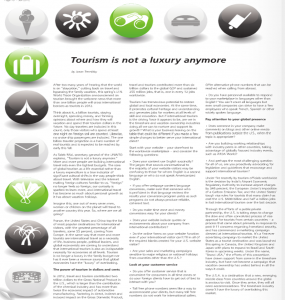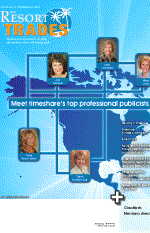Why Sell My Timeshare NOW Says: You Have 8 Seconds Left
Wednesday, January 2, 2013
From the pages of the December issue of The Resort Trades, we are reprinting this article by Jason Tremblay of Sell My Timeshare NOW and VacationOwnership.com. In the article, “You Have 8 Seconds Left,” we look at the challenges anyone (and everyone) in sales and marketing faces in this fast-changing world where distraction dominates and over-stimulation is the norm.
For timeshare sellers and timeshare resellers, the challenge will be not only how to differentiate oneself from one’s competitors, but how to hold the fleeting attention of prospective timeshare buyers and renters, once their attention is gained.
You Have 8 Seconds Left
by Jason Tremblay, founder of Sell My Timeshare NOW and Vacation Ownership.com
In the year 2000, according to Psychology Today and other credible sources, the average person’s attention span for any one thought was a mere 12 seconds. Yet as pathetic as that sounds, the even more frightening news is that this number has dropped by 40 percent, leaving us with eight seconds in which to engage, attract, express, build, sell, grow, bond, and communicate.
Or have I already lost your attention?
To put it another way, according to research by whoever is in the business of measuring the brain functions of goldfish, a goldfish with its nine-second attention span now has a human outpaced when it comes to the ability to focus. For business, this means you have eight seconds to get the attention of consumers, and if you succeed, you have another eight seconds in which to present your message. Then, if you are still managing to capture their interest, you have eight additional seconds in which to close your sale, make your point, or cement your relationship. And these numbers also apply to the attention spans of your sales team, marketing staff, IT department, HR team, and everyone else in your company you are counting on to make your business run.
You can debate whether our dwindling capability to concentrate should be blamed on our diet, our life style, chemicals in our environment or any number of other possibilities, but there is one culprit that no one disputes. Computer use is making us both smarter and dumber simultaneously; both faster at what we do and increasingly inefficient in our ability to do it.
In the U.S., the average adult spends a combined 8.5 hours per day in front of a monitor of some type, either a computer, smart phone, or television. Although a large portion of this time is work related, the rest is by choice. Among teens, with the use of computers for study, and of televisions, video games, and smart phones for everything else, the amount of time spent on line has gone from 3.43 hours a day in 2000, to seven hours per day, seven days a week.
Since 2000, overall Internet use in the United States has risen by 127 percent. During this same period, the diagnosis of ADHD (Attention Deficit Hyperactivity Disorder) has increased by 66 percent. Maybe doctors and clinicians are better at diagnosing the condition than they were 12 years ago, or perhaps overall awareness of ADHD is better and because of it, more people are being tested for the dysfunction. But the potential link between our increasingly computer-centric lives and our decreasing capability to focus is both obvious and hard to ignore.
In a future world, that has already begun, where people spend increasing percentages of their days distracted by bits and bytes of information that incessantly demand one’s attention, the need for a respite from this will be (and already is) crucial. Getaways, vacations, long weekends, and relief from our daily routines will be of greater importance in our lives than ever before, perhaps not only mentally necessary, but medically necessary, as well. It’s logical to anticipate that the demand will be for easy access, easy implementation vacation options. The timeshare and vacation ownership industry will need to make the shared ownership product fully flexible in order to accommodate work schedules that are anything but flexible.
While some vacationers will seek true escapes, most will gravitate toward resorts that offer serene space and relaxing experiences, yet still afford guests maximum connectivity options to reconnect with all of their devices and platforms on an “as needed” basis. How much does connectivity matter during a vacation? Travelers and vacationers rank the need for free Wi-Fi only 3 percentage points lower than they rank the importance of a comfortable bed.
This strange, distracted, always-connected world is our reality. Although it is hard to imagine, attention spans will likely become shorter. As business professionals, we will be called to get our message out to our market in ways that are sharper and more exciting. We will need to capture and hold the consumer’s interest in smaller and smaller snippets of time. More importantly, not only are the fish for which we all compete growing less interested, but also the ocean in which they swim is getting bigger and bigger. In the year 2000, there were eight million live websites and 15.6 million registered domain names. By 2011, those numbers had increased to 366.8 million live websites and a whopping 555 million registered domains.
As daunting as this task sounds, we actually may have found ourselves in the right business at the right time. Timeshares, if we can deliver them through the channels our market wants to receive them, could become a critical part of the necessary decompression process from daily life for a whole new market of owners and renters. In timeshare and vacation ownership, it’s easy to get caught up, thinking that we sell points, units, weeks, or intervals. We don’t. We are in the business of selling life-changing moments, a product sure to be in hot demand …as long as we manage to communicate our message in eight seconds or less.
Sell My Timeshare NOW appreciates The Resort Trades for permission to reprint this article.






